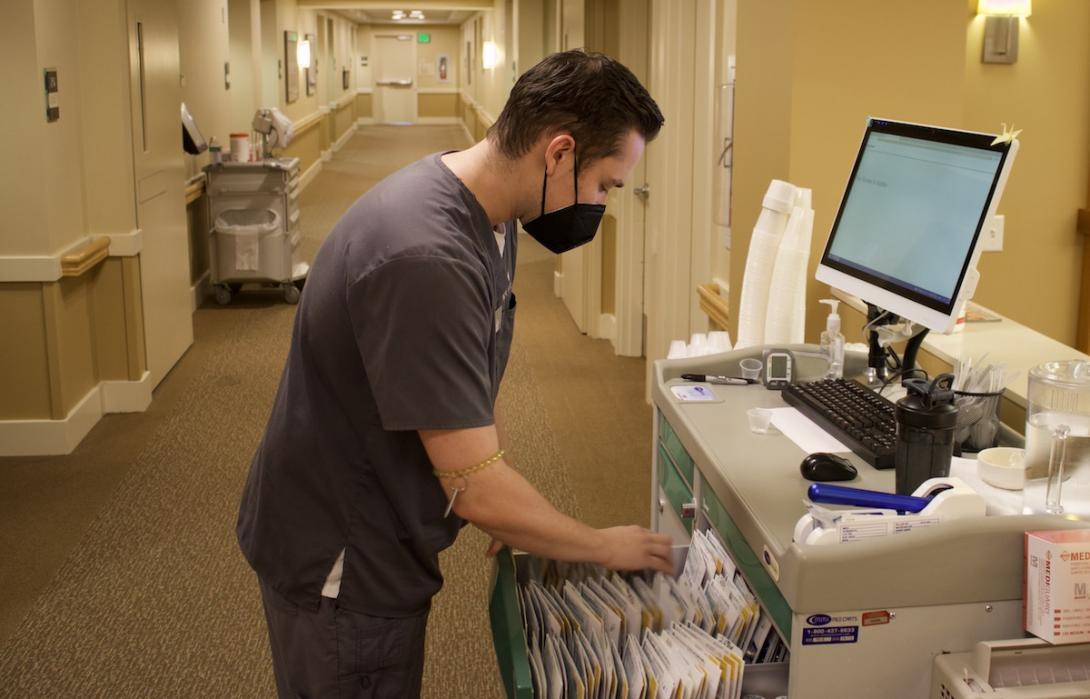
Oregon is among a handful of states best-positioned to meet new federal staffing requirements for nursing homes issued by the Biden administration, according to a new study.
But according to the state lobbying group representing Oregon’s nursing homes, the study doesn’t take into account its members’ lack of readiness to meet a key requirement, due to persistent nursing shortages.
On May 21, the nonprofit health policy think tank KFF, formerly known as the Kaiser Family Foundation, released a new analysis that attempted to gauge the preparedness of nursing homes to comply with staffing rules finalized by federal authorities last month. The rules, which were opposed as onerous by the nursing home industry, are intended to address what officials have called chronic understaffing at nursing facilities by specifying how much care residents should receive daily.
The study omitted the “critical piece” of whether nursing homes could provide registered-nurse coverage for patients 24 hours a day, every day, as the new regulations require, according to a spokesperson for the Oregon Health Care Association.
In an email to The Lund Report, Rosie Ward noted that KFF’s research used limited data that did not evaluate readiness for all of the rules’ requirements. Notably, KFF was unable to assess how well nursing homes could comply with the rules’ requirement to have a registered nurse on duty 24/7, and left it out of its report.
Ward pointed to data from national trade groups showing that 97% of Oregon nursing homes could not meet the 24/7 requirement. Nationally, that figure is 80%, the data shows.
“If nursing facilities can’t comply with these requirements, they will be forced to limit admissions, downsize, or, ultimately, close altogether,” Ward wrote. “Once this rule goes into effect, Oregonians will face issues accessing nursing facility care.”
Kristin Milligan —CEO of LeadingAge Oregon, which represents organizations that provide services for the elderly — told The Lund Report in an email that her group shares similar concerns. She pointed out that the new rule does not include funds to encourage registered nurses to work in long term care facilities. She wrote that the“aging services sector urgently needs support as we navigate staffing challenges amidst a rapidly aging population and an increase in demand for services.”
The Oregon Health Care Association’s stance reflects a position taken by its parent organization on the national level. The American Health Care Association has called the federal rule an “unreasonable standard that only threatens to shut down more nursing homes.”
The KFF analysis concluded that 19% of nursing facilities nationally had enough staff to meet the rules’ requirements. A majority of nursing facilities in only five states — Oregon, Alaska, Hawaii, North Dakota and Maine — and the District of Columbia had enough staffing to meet the rules requirements, the research found.
The rules have three main staffing minimums. In addition to 24-7 registered-nurse coverage, facilities’ nurse aides (or certified nursing assistants) must provide residents with two and a half hours of care each day. Registered nurses, who administer medications and can implement treatment plans, must provide about a half hour of care daily to residents. Overall, residents must receive at least three and a half hours of care each day.
KFF researchers concluded that 90% of 126 nursing facilities in Oregon could meet the overall requirement. About the same percentage of Oregon nursing facilities could meet the nurse aide requirement. Just under two-thirds of Oregon facilities could meet the registered nurse requirement and about the same proportion that could meet all three requirements.
Ward wrote that Oregon is already in a nursing shortage. She pointed to a 2023 state report showing that Oregon already produces the third fewest nurses in the country.
An earlier analysis from KFF similarly found that Oregon was in a strong position to comply with the staffing requirement. At the time, Philip Bentley, president and CEO of the state nursing facility trade group said that the shortage of registered nurses already has his members limiting how many residents they can take, a problem he said the rules could make worse.
Not until May 2026 would urban nursing facilities be required to have a registered nurse on duty 24/7. Those in rural areas would have another year to comply. And nursing facilities can apply for exemptions during a labor shortage.